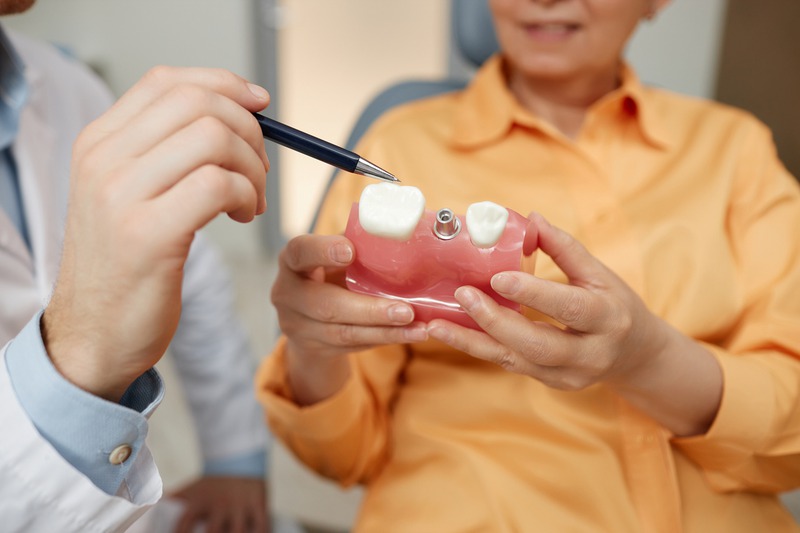
When Should I Consider Getting Dental Implants?
Deciding whether to get dental implants can be crucial in your oral health journey. Dental implants are a long-term solution for missing or severely damaged teeth, offering a durable, stable, and aesthetic alternative to traditional dentures or bridges. Whether due to trauma, decay, or congenital conditions, tooth loss can significantly impact your quality of life, hindering your ability to eat, speak, and confidently smile.
Dental implants are a popular and effective solution for replacing missing teeth, offering a long-term option for restoring your smile and maintaining oral health. Here are some critical situations and considerations that might indicate it’s time to consider getting dental implants:
1. Missing One or More Teeth
Dental implants for replacing missing teeth can be an excellent option if you have lost one or more teeth due to injury, decay, or periodontal disease. Implants provide a stable foundation for prosthetic teeth, ensuring they look, feel, and function like natural teeth.
2. Difficulty Eating and Chewing
Missing teeth can make it challenging to eat certain foods, impacting your diet and nutrition. If you find it difficult to chew or experience discomfort while eating, dental implants can help restore your ability to enjoy a wide variety of foods without pain or difficulty.
3. Unhappy with Dentures or Bridges
Dentures and bridges are standard solutions for missing teeth but have certain drawbacks. Dentures can slip and cause discomfort, while bridges may require the alteration of adjacent healthy teeth. Dental implants may provide a more comfortable and permanent solution if you are dissatisfied with your current dentures or bridges due to discomfort, maintenance, or aesthetics.
4. Jawbone Health and Structure
Tooth loss can lead to bone loss in the jaw, which can alter the shape of your face and affect your oral health. Dental implants stimulate the jawbone, helping to preserve bone density and maintain facial structure. Dental implants can help prevent further bone loss if you are concerned about jawbone deterioration.
5. Seeking a Long-Term Solution
Dental implants are known for their durability and longevity. Proper care can last a lifetime, making them a cost-effective and long-term solution for tooth replacement. Dental implants are worth considering if you prefer a permanent solution over temporary fixes.
6. Maintaining Oral Health
Missing teeth can lead to various oral health issues, including shifting adjacent teeth, bite problems, and an increased risk of gum disease. Dental implants help maintain the alignment of your remaining teeth and contribute to overall oral health. If you’re considering implants as a viable option to protect your oral health and prevent further dental problems, visit My Dental Home for a full range of dental services.
7. Speech Improvements
Missing teeth or ill-fitting dentures can affect your speech, causing you to slur or lisp. Dental implants provide a stable and secure fit for artificial teeth, improving your ability to speak clearly and confidently.
8. Self-Confidence and Appearance
A complete, healthy smile can significantly boost your self-esteem and confidence. Dental implants can provide a natural-looking and aesthetically pleasing solution if you feel self-conscious about missing teeth or the appearance of your dentures. By opting for dental implants, you can rejuvenate your smile and regain that sense of self-assurance you’ve been missing.
9. Suitable Candidate for Implant Surgery
Certain health conditions and habits can affect the success of dental implants. Ideal candidates should have:
-
Good Oral and Overall Health: Healthy gums and adequate bone density support implants. Chronic conditions like diabetes need to be well-controlled.
-
Non-Smokers or Willing to Quit: Smoking can interfere with the healing process and success of implants.
-
Commitment to Oral Hygiene: Regular dental check-ups and good oral hygiene practices are essential for the long-term success of implants.
10. Desire for Improved Quality of Life
If missing teeth or uncomfortable dentures negatively impact your quality of life, dental implants can provide a solution that enhances your daily experiences. From improved comfort to restored functionality and aesthetics, implants can significantly improve your overall well-being.
Consultation and Evaluation
Before deciding on dental implants, it’s essential to consult with a dental professional who specializes in implant dentistry. They will conduct a thorough evaluation, including:
-
Medical and Dental History: Assessing any conditions or medications that might affect the procedure.
-
Oral Examination: Checking the health of your gums and the amount of bone available for the implant.
-
Imaging Tests: X-rays or CT scans determine bone structure and plan implant placement.
Wrapping Up
Dental implants are an excellent solution for replacing missing teeth, offering numerous benefits such as improved oral health, enhanced appearance, and better functionality. If you have missing teeth, difficulty eating, dissatisfaction with dentures, or concerns about bone health, consider discussing dental implants with your dentist. A thorough evaluation and consultation will help determine if implants are the right choice for you, paving the way for a healthier, more confident smile.
